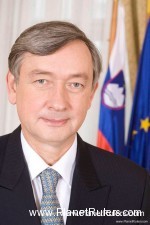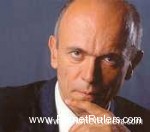Dr. Danilo Türk, President of Slovenia
Dr Danilo Türk was born on 19 February 1952 in Maribor, Slovenia. He studied at the Faculty of Law, University of Ljubljana, Slovenia, where he obtained his law degree (1975) with a dissertation on “Procedural bases for enforcement of the rights of Slovenian and Croatian minorities in Austria before UN authorities”. After his degree, he started to work as secretary of the Commission for Minorities and Migrants of the Socialist Alliance of the Working People of Slovenia (SZDL). In 1978 he obtained his masters degree in law from Belgrade University with a dissertation entitled “Protection of Minorities and International Law”, became an academic assistant and started teaching International Law at the Faculty of Law in Ljubljana. After his military service he resumed his work on minority issues and served as Chairman of the SZDL Commission for Minorities and Migrants until 1981. In 1982, he obtained his doctorate from the Faculty of Law in Ljubljana with a thesis on “The principle of non-intervention in international relations and in international law”.
He continued his academic career at the Faculty of Law in Ljubljana where, in December 1982, he became assistant professor, then associate professor (1987) and finally tenured professor of international law (1995). In the period 1983-1992 Dr Türk headed the university’s Institute of International Law and International Relations. In these years he devoted his energies to research and teaching, and efforts for the protection of human rights. Since 1975 he has been actively involved with Amnesty International and has acted as adviser in many cases involving human rights violations in the former Yugoslavia. From 1984 to 1992 he was member of the United Nations Sub-Commission on Prevention of Discrimination and Protection of Minorities as an independent expert and acted in his personal capacity. For the Sub-Commission he prepared a report on the right to freedom of opinion and expression and a series of reports on the putting economic, social and cultural rights into practice. In 1991 he was the Chairman of the Sub-Commission.
In 1987 Dr Türk initiated and participated in the establishment of the Human Rights Council in Slovenia. The Council was established early in 1988 under the auspices of the SZDL and from 1989 on it functioned as an independent institution. Dr Türk was the Vice-President of the Council. After Slovenia’s declaration of independence Dr Türk took an active role in its diplomatic activity. In July and August 1991 – with the authorisation of the Minister of Foreign Affairs – he informally represented the still unrecognised Slovenia in Geneva in contacts with representatives of the UN, the CSCE and the Council of Europe. From September 1991 to August 1992 he was a member of the Slovene delegation at the Conference on Yugoslavia. On behalf of Slovenia Dr Türk prepared a number of draft memoranda for the Arbitration Commission of the Conference on Yugoslavia (the Badinter Commission). The first memorandum, written in November 1991, was the key document on which the Commission founded its statement that Yugoslavia had dissolved and that all the successor states were equal in status.
In 1992 Dr Türk assumed the position of Ambassador of the Republic of Slovenia to the United Nations. During his term on the Security Council from 1998 to 1999 he dealt with the issues of Kosovo, Iraq, Libya, East Timor, Congo among others.
Following the successful conclusion of Slovenia’s term as non-permanent member of the Security Council, Mr Kofi Annan, the Secretary-General of the United Nations Organisation, appointed Dr Türk as Assistant Secretary-General for Political Affairs. For more than five years his tasks included analytical and consulting activity relating to the crisis situations of the time, such as the Balkans (in particular Kosovo and Macedonia), Palestine, Lebanon, Afghanistan, Iraq, Myanmar, North Korea, East Timor, Columbia, Haiti, Venezuela and others. After 13 years in New York Dr Türk returned to Slovenia in the summer of 2005. He resumed teaching International Law and related subjects at the Faculty of Law in Ljubljana. Since May 2006 he has served as Vice-Dean of the Faculty of Law.
On 11 November 2007 he was elected President of the Republic of Slovenia by 68,03% votes and was inaugurated in the National Assembly on 22 December 2007.
LINK: http://www.up-rs.si/
Dr. Janez Drnovšek, Former President of Slovenia
Dr Janez Drnovšek was sworn in as President of the Republic of Slovenia at the National Assembly on 22 December 2002, after he had presided for ten years over both the Government of the Republic of Slovenia and the leading parliamentary party, the Liberal Democracy of Slovenia. As president of the Liberal Democracy of Slovenia, he succeeded in leading the party to victory at the parliamentary elections three times, in 1992, 1996, and 2000.
Dr Janez Drnovšek was born on 17 May 1950 in Celje. He graduated in economics at the University of Ljubljana’s Faculty of Economics. In 1986, he finished his doctoral studies in economic science at the Faculty of Economics and Business in Maribor. In 1994, he received an honorary doctorate from the University of Boston, and in 1999, an honorary doctorate from the Illinois Wesleyan University. In 2004 he also received the honorary functions of Protector and Honorary Senator of the European Academy of Sciences and Arts from Salzburg.
Until 1989, he held various positions in the economic sector and was involved in credit and monetary policy. After a successful career in banking, Dr Drnovšek was elected as the Slovene representative in the collective presidency of the former Yugoslavia at the first free and democratic elections in April 1989. From May 1989 to May 1990 he was the Head of the Presidency of the former Yugoslavia. In September 1989, he presided over the Summit of the Non-Aligned in Belgrade. During Slovenia’s independence negotiations, Dr Drnovšek was the principal negotiator between the Slovene leadership and the leaders of the former Yugoslavia and the high command of the Yugoslav People’s Army. In July 1991, he successfully negotiated the final withdrawal of the Yugoslav Federal Army from Slovenia. In recognition of his outstanding merit in defence of the freedom and sovereignty of the Republic of Slovenia, on 24 July 1992 Dr Drnovšek received the highest state decoration, the Golden Order of Freedom of the Republic of Slovenia.
During his years of political activity, Dr Drnovšek has taken part in many international meetings, conferences and forums with participants from the highest levels. For his political, economic and humanitarian achievements and personal contribution to Slovenia’s successful transition to democracy and its development into a democratically and economically stable country, as well as towards its inclusion into the European and international communities, Dr Drnovšek has received a number of international awards, such as Le prix de la Méditerranée (Crans Montana Forum, Malta, October 1995), the Public Leadership Award (Hubert H. Humphrey Institute of Public Affairs, University of Minnesota, May 1997), the award of the Fund for American Studies (American Institute of Political and Economic Systems, Prague, August 1998), the Diálogo Europeo award (Madrid, November 1998), and the Ramón Trias Fargas award (Barcelona, November 2003).
Dr Drnovšek is a frequent guest of honour and lecturer at prestigious international establishments and universities all over the world. He is also the author of many articles in the fields of credit control and monetary policy, as well as on international financial relations, in which he has focused on the world loan crisis. In 1996, his book was published, Moja resnica (Escape from Hell), in which Dr Drnovšek described his experiences and views of the break-up of the then Yugoslavia. In recent years, Dr Janez Drnovšek has been publishing his analyses of and commentaries on topical international questions, in the most important world media. As President of the Republic of Slovenia, Dr Drnovšek has promoted a debate on the future of the Republic of Slovenia and has invited Slovene experts in various fields, academicians, scientists, economists, and various other representatives of Slovene society to participate in a wide public debate in order to highlight the topics that are of vital importance to the future of the Slovene state.
In 2006, Dr. Drnovšek launched an international initiative to start a humanitarian action “World for Darfur”, for which the letter of support was signed by a number of prominent world personalities. He is also the initiator of the project “Fruits of Society” of which the purpose is to stimulate voluntary service activities and intergenerational cooperation. This year, Dr. Drnovšek also founded the Movement for Justice and Development. In May he wrote the book “Misli o življenju in zavedanju” (The Thoughts of Life and Awarness) which focuses on the man, his search for inner equilibrium, inner peace, and gaining awareness of his own self and the world. The translation of The Thoughts of Life and Awarness is already available to readers in Croatia. A new booklet “Zlate misli” (Golden Thoughts) was published in October and offers readers thoughts adapted from the previous book and also includes some new ones. Dr. Drnovšek has already written a new book The Essence of the World that represents an upgrade of his previous work The Thoughts of Life and Awarness. The book was published first in German and than in Slovene.
Dr Drnovšek is fluent in English, French, Spanish, and German.



